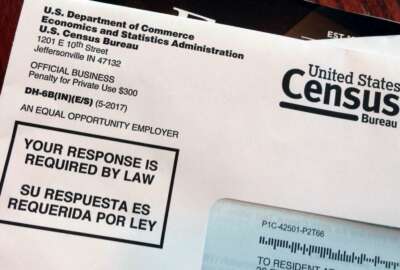

The Census Bureau encourages households to self-respond to reduce the need for enumerators to knock on doors later this spring.
Less than a week into the Census Bureau’s kickoff of the 2020 population count, the bureau has hit the brakes on its in-person fieldwork for the next two weeks, to help prevent the spread of the coronavirus pandemic.
Census Bureau Director Steven Dillingham said Wednesday that the bureau will suspend 2020 census field operations until April 1, 2020.
“The Census Bureau is taking this step to help protect the health and safety of the American public, Census Bureau employees, and everyone going through the hiring process for temporary census taker positions,” Dillingham said in a statement.
The bureau has kept up a stream of updates during the pandemic. Following the launch of an internal task force last week, the bureau made its first indication that it was prepared to “delay or discontinue” non-response follow-up in communities hardest hit by COVID-19, the illness caused by the latest strain of the coronavirus.
The bureau encourages households to respond to the 2020 census online, over the phone or through a traditional paper questionnaire in order to reduce the need for enumerators to knock on doors later this spring and follow-up with those who have yet to respond.
So far, more than 11 million households have responded to the census. The bureau plans to update self-response rates every day through June.
House Oversight and Reform Committee Chair Carolyn Maloney (D-N.Y.) stressed that the two-week pause in field operations doesn’t limit the ability of households to self-respond to the 2020 count.
“By responding now, you will ensure that the Census Bureau does not need to send a census worker to your door. The Oversight Committee is closely monitoring the suspension of field operations and other developments to ensure that the Census Bureau takes all necessary steps to keep people safe while conducting a full, fair, and accurate census,” Maloney said.
Michael Cook, the bureau’s public information chief, told the Federal Drive with Tom Temin that the bureau has adapted some of our field operations to ensure social distancing, and has changed or postponed operations focused on large groups.
“We’re carefully monitoring the situation and working with the national, state and local health authorities to ensure that all of our field operations are taking into account the safety and the health of our employees, but as well the public,” Cook said.
Under the bureau’s normal timeline, enumerators across the country would conduct an in-person count of people experiencing homelessness March 30 through April 1.
The pandemic also disrupts the bureau’s plans to send enumerators to colleges in April to count students who live on campus, as well as residents as senior centers and other group living arrangements.
In most cases, students sent home from colleges and universities because of the coronavirus should still be counted at their school.
As recently as last week, the bureau continued its fieldwork for non-decennial surveys by phone in areas with an outbreak of COVID-19. Now the bureau will opt completely for phone calls over in-person visits, except for a “limited number of instances,” where it will work with public health authorities to conduct in-person surveys.
The Trump administration now urges agencies to “maximum telework flexibilities,” but those that provide public-facing services have responded in a variety of ways.
The Social Security Administration and U.S. Citizenship and Immigration Services closed all field offices Tuesday. The IRS, meanwhile, has given its employees the discretion to decide if they want to continue in-person interactions with their customers.
The Postal Service, however, considers its operations “an essential service” when it comes to state and municipal shelter-in-place orders or other social distancing restrictions.
USPS, in updated guidance released last Friday, urged supervisors and managers to “allow liberal sick leave for employees who are sick,” but postal unions said that policy remains a point of contention.
“The Postal Service delivers medications, social security checks, and is the leading delivery service for online purchases,” the agency said in a statement.
Copyright © 2025 Federal News Network. All rights reserved. This website is not intended for users located within the European Economic Area.
Jory Heckman is a reporter at Federal News Network covering U.S. Postal Service, IRS, big data and technology issues.
Follow @jheckmanWFED

